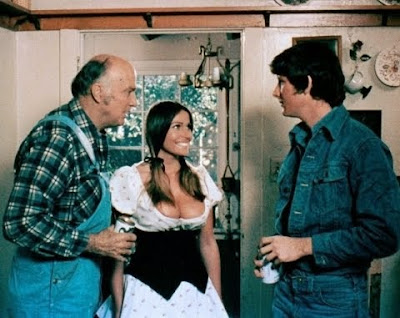The Verdict
1982's THE VERDICT is a filmed masterpiece. A choice example of how to polish the old underdog victory tale and create what I consider to be a work of art. David Mamet, known for a very distinctive style of dialogue, did write the screenplay, and is good as it is, to me it is the weakest element of this movie. Great films don't necessarily come from great screenplays. I say this regarding THE VERDICT for several reasons: there are holes in the plot; there are questionable actions committed by lawyers and judges that would likely get them dismissed (if not disbarred); there are some contrived elements. Viewers who appreciate and recognize how to discern cinematic art will not be distracted by such deficiencies.
Orchestrating THE VERDICT is the great Sidney Lumet, director of too many landmark films to mention. THE VERDICT joins them. Rarely has a film been as effective in stillness and silence as it is in its more audible moments. Many of the later scenes occur in a courtroom, with a few intense exchanges and a witness stand breakdown. Just about every movie and T.V. show with this setting have verbal fireworks in chambers and in court. To convey the urgency of a broken soul vying not just for a professional comeback but also some sort of redemption requires less, for more.
Newman plays Frank Galvin, a once prominent Boston lawyer whose whistle blowing against corruption in his firm some years back earned him jail time and a broken marriage. He now spends his days drowning in booze and playing pinball. Reduced to scouring the obituaries and trolling funerals for potential clients. When his old mentor Mickey (a feisty Jack Warden) sends a medical malpractice case his way, Galvin sees a potential glimmer in the darkness. Mickey, too, knowing that the Archidiocese would rather settle out of court than have the Catholic hospital suffer bad publicity. But then Frank visits the victim - a young woman who became comatose after improper administration of an anesthetic - in her facility. He sees more than a surefire payday; he feels a moral obligation.
Frank's decision to go to trial is a surprise to everyone, including the obstinate judge (Milo O'Shea). The victim's sister and brother-in-law are angered and bewildered. Does Galvin really believe he can win?
Lumet uses interiors and exteriors very effectively. The drab color palate suits the mood . Deep browns of courtrooms and offices. Dark spaces, barely lamplit. The bite of winter informs outdoor scenes, whether seen in close-up (Frank's realization that his star witness has bailed on him) or from a bird's eye view (Mickey informs Frank of a stinging betrayal). I especially like the second example, filmed with only the sounds of the city. Perhaps Lumet felt it more effective that way. I agree; the pain Frank feels at that moment is best observed from such a vantage point, with the loneliness of the city about him. Andrzej Bartkowiak's cinematography is perfect at every moment.
Newman is simply great, using expressions and relatively spare dialogue to convey his personal hell. The bathroom scene, the one in which he is crippled in anxiety, will ring painfully familiar not only to recovering addicts but anyone ever paralyzed by the fear of failure. James Mason is appropriately menacing, yet always so dapper and polished, as the opposing counsel. Charlotte Rampling is elegantly downtrodden, beautiful yet unspeakably sad, as Laura, a woman with whom Frank becomes involved. The attraction is understandable for several reasons; they do have much in common.
I also really like the final scene, where one pays for their sins and the other, though perhaps troubled in the moment, enjoys a moment of respite.



Comments